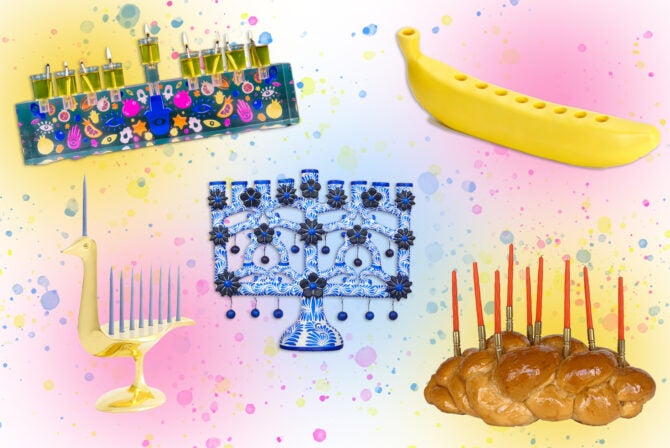My husband and I used to joke that if we dropped our 8-year-old son Tamir in the middle of Kazakhstan, he would be just fine. He’s a kid with that kind of know how, sense of self, and “I got this Mom, you go lie down” attitude. And while he has a natural proclivity toward self-sufficiency, now that we are raising him in Israel, his sense of independence has catapulted forward.
On a visit to a kibbutz a couple of weeks ago, he was all about doing everything himself. While my husband and I were bogged down with our two other children, bathing suits, and the application of the sunscreen on their lithe little bodies, Tamir was off. “Meet you at the chadar ochel (dining room), K?” At home in Jerusalem, we don’t even let him walk to the makolet (bodega) down the street by himself.
But on a kibbutz, the idyllic commune-like environment allowed us to extend the umbilical cord a bit further. Finally when we arrived at the dining room, there he stood at the juice maker, large knife in hand, prepping oranges for the hand-held juicer. A big smile crept over his face, a mirror to the smiles of the other kibbutzniks who were next in line, proud of this little pioneer and how capable he was.
In Israel, that kind of behavior is expected of kids from a young age. Whereas if that scene had taken place in the States, the facial expression of surrounding grown-ups would read, “Knife? Really?”
That’s how we roll in these parts. From a young age, children are given a lot of responsibility, leeway, and encouragement to take initiative.
We moved from the Hamptons in New York to Jerusalem two years ago. In no small measure it was so that our three kids could be in an environment where their Jewish identities would be organic and strong. Here, Shabbat doesn’t happen only in our house; it’s happening everywhere. Here, everyone is on vacation during Passover because that’s when the schools close and nobody in their right mind expects a work-call to be returned. Here, we don’t need to pay a lot of extra money to give our kids a Jewish education. Every week they learn bible stories and commentary as a basic part their literacy. By living in Israel, their Jewish selves are fully realized.
By living here, they’ve received a crash course in being Israeli, too. They feel fully at home. They speak the language and are beginning to understand the culture even better than their immigrant parents.
And sometimes there’s a downside to being so confident with a “go at it on my own” kind of attitude. Tamir can be brazen, obstinate, and sometimes, just plain rude. Take the other night at dinnertime. While my three kids speak Hebrew fluently, we insist that they speak English when we are all at home. Not in small part because in Hebrew, they are a lot more demanding. Hebrew speaking Tamir says, “T’vi li et ha-chalav!” (Give me the milk!) Ahem—English please, I insist. And when he turns to the mother tongue, preferred words like “please” and “would you mind” enter the sentence. Not to mention his voice register goes up a few octaves.
What I love about the concept of independence is that in the Hebrew word, az’maut, there are two words at the root: otzmah, meaning “strength,” and etzem meaning bone or “core.” Being independent demands a kind of strength—to try new things, to take risks, to be criticized by others, to bounce back, and to be resilient. But even more than that, the real strength lies in returning to one’s sense of self or “core.”
At this stage in their lives, a lot of what our kids hear from us will become their core understanding of themselves. The core messages I tell my kids are about the power of being a good friend, of helping others who need your help, standing up for the underdog, being grateful for everything, and loving with all your heart. Just like Tamir is now young, independent, and full of strength, I hope that when he grows, and encounters obstacles, or loses his way, that he will be able to return to these core pieces of what ultimately make him strong.
And now that Israel’s Independence Day is here, these dual concepts that make up the term “independence”—strength, and returning to the “core”—can animate how we celebrate Israel, too.
Israel, now 68 years old, was once a young country—brazen, brave, and reveling in the feelings of “I can go at it alone,” just as a young boy might. Reviving an ancient language, draining the swamps, building the State, and fighting off attacking armies? That took some serious chutzpah.
But whenever we as a country are losing our way, I want to remember that our strength lies in returning to our core, or the etzem, of what makes us, us.
Israel’s core is best captured in the Declaration of Independence. One line, which is a part of the introduction, particularly strikes me this year:
“[The] Pioneers…made deserts bloom, revived the Hebrew language, built villages and towns, and created a thriving community controlling its own economy and culture, loving peace but knowing how to defend itself, bringing the blessings of progress to all the country’s inhabitants, and aspiring towards independent nationhood…”
The line is meant to be descriptive of what the pioneers did back in the pre-State years. On this Yom Ha’atzmaut, I want to return to that sense of awe and gratitude of what those early pioneers accomplished. But I also want to read the statement as aspirational—what does it mean to “love peace” and also “know how to defend” the State? How can I, along with my family and other Israelis, be realistic about threats that surround us and idealistic enough to love peace and pursue it in every interaction, every day?
Independence is a good thing. Let’s continue raising children to be independent, strong, sensitive, and kind. And let’s continue to build Israeli society that way, too.
Read More:
Don’t Worry—All The Other Moms Are Faking It Too
Uncovering My Grandmother’s Traumatic Past
I’m Really Bad at Saying No And It’s Stressing Me Out







